|
Introduction
This match between Grandmasters Bent Larsen and Lubomir Kavalek was of eight games up. It was played in Solingen, a city in North Rhine-Westphalia, Germany, from 30th May to 7th June 1970. The match was sponsored by the Solingen Chess Club. Solingen was one of the top German chess clubs, supported by a rich sponsor. In 1971, they would become the winner of the West German club championship. 1. Larsen's 5-1 victory over a strong grandmaster has been generally forgotten, but it is an example of his fighting play when in his best form. The players
Larsen was 34 years old and Kavalek 26. Larsen was the fifth equal with Petrosian (2650) and Kavalek was 58th (2510) on the contemporaneous ELO rating list issued in July 1971. 2 Larsen
The period 1967-1971 saw Bent Larsen at the peak of his form and he was considered as a serious world championship candidate. 3. In a consecutive run of ten very strong grandmaster events between August 1967 and March 1970, Larsen only had twice failed to win first prize at Palma de Mallorca (1968) coming second equal with Spassky behind Viktor Korchnoi. His only other setback was to lose the Spassky - Larsen Candidates Semifinal (1968) (Malmö, July 1968). Larsen's chain of victories in strong tournaments was: Havana 1967, ahead of Mark Taimanov and Vasily Smyslov Winnipeg (1967) shared with Darga ahead of Paul Keres and Spassky; Sousse Interzonal (1967), ahead of Viktor Korchnoi, Efim Geller and Svetozar Gligoric Palma de Mallorca (1967) ahead of Mikhail Botvinnik, Vasily Smyslov, and Lajos Portisch Monte Carlo (1968) ahead of Mikhail Botvinnik, Vasily Smyslov, and Vlastimil Hort US Open 1968 ahead of Pal Benko and Walter Browne Büsum 1969, Palma de Mallorca (1969) ahead of Petrosian, Viktor Korchnoi and Boris Spassky, and Lugano (1970) a point ahead of Fridrik Olafsson and 3½ points ahead of Kavalek in 7th place. In this period he also defeated Lajos Portisch - Larsen - Portisch Candidates Quarterfinal (1968) (Poreč 1968) and Tal (Third place Candidates Playoff - Eersel 1969) in the Candidates' series and was joint 2nd-4th with Hubner and Geller behind Fischer at the Palma de Mallorca Interzonal (1970), being the only player able to defeat Fischer in the competition - Fischer vs Larsen, 1970. "Living on his nerves ... Bent Larsen of Denmark added one more excellent first prize to his laurels when he outdistanced at Palma de Mallorca in December a field containing the last two world champions and 15 other masters and grandmasters of high calibre. The manner in which he won was very typical. His method is in complete contrast to that of almost all the other leading players of the world. The 12 points he scored were made up of ten wins, four draws and three losses. Compare this score with the two world champions. Both went through unbeaten. Petrosian (the "ex") had six wins, eleven draws. Spassky, the world champion today, had three wins and fourteen draws! To lose three games in a tournament of this calibre yet finish first, is a fantastic feat...The shock of seeing victory, virtually earned, by mental toil spread over two days, turned into defeat in a moment, would stun most players. It only seems to make Larsen play better. It is not that he lacks feeling - I have witnessed the pain in his eyes — but he has a marvellous spirit of determination, a gift for summoning up the very best in himself, in the teeth of adversity. Anyway, at Palma, as so often, he came back, time and time again, to thrash opponents..." 4. Larsen was working hard. (After losing to Boris Spassky at Leiden) Larsen replied: 'I have to sleep, for at least three months'. That is what his wife also declared to us, albeit Larsen plans to play a match against Grandmaster Kavalek at the end of May. Then he wants to take a holiday until the Olympiad, which is held in September in Siegen." 5. Larsen having qualified for the Candidates Quarterfinals, his opponent would be Wolfgang Uhlmann in Las Palmas (13-30 May 1971) Larsen - Uhlmann Candidates Quarterfinal (1971). Larsen took first board ahead of Fischer in the USSR vs. Rest of the World (1970) (March 29th and April 4th, 1970) tying with Boris Spassky and defeating substitute Leonid Stein, but lost 6-0 to Fisher in Denver, July 1971. Kavalek
Kavalek had fled Czechoslovakia after the Warsaw Pact invasion (Wikipedia article: Warsaw Pact invasion of Czechoslovakia) and had been stateless since August 1968. "...Ludek Pachman is languishing in a Czech gaol for the offence of campaigning against the occupation of his country by Russian, Polish and other forces ... Another Czech Grand Master Kavalek went with Pachman to the chess Olympiad at Lugano. Each of them declined to play in the Czech national team there, because of the situation in their country. Kavalek went on to Holland, where he has played with success in matches and tournaments and is no doubt reasonably happy. Pachman went back to Czechoslovakia ..." 6. These were difficult times for Kavalek, The Czechoslovak Chess federation purposefully made life difficult for him protesting that he still played under the Czechoslovak flag. After leaving Czechoslovakia, Kavalek lodged in Munich and was played in Holland and West Germany. He defeated the Dutch Champion Hans Ree 7-3 (Eersel 1969) in a match and had achieved some solid if unspectacular results against top-class competition. He had been 9th at Amsterdam IBM 1969, 10th at San Juan, 1969 and 4th at Game Collection: Wijk aan Zee Hoogovens 1970. Kavalek was re-establishing his life and career. In July 1970 he emigrated to the USA to live in Washington D.C. His rating made him second to Fischer in the American lists and by the mid-1970's he would rise into the top twenty in world rankings. Despite losing this match, Kavalek began to achieve better results as he created a new life in the West. At his next tournament, Caracas 1970 (June-July 1970), he represented the USCF, "When you...have no country to go home to, you feel all at sea. But when I came out of the sea to Caracas and saw the American flag on my chess table, I knew I was firmly on the ground". 7. Progress of the match "Larsen proved much the superior in a slugging encounter in which both players were out to win every game." 8. 1 2 3 4 5 6 7 8
Kavalek 0 ½ 0 0 0 1 0 ½ 2
Larsen 1 ½ 1 1 1 0 1 ½ 6
Progressive score: 1 2 3 4 5 6 7 8
Kavalek 0 ½ ½ ½ ½ 1½ 1½ 2
Larsen 1 1½ 2½ 3½ 4½ 4½ 5½ 6
Larsen had White in the odd-numbered games.The games
Game 1 - Larsen came out of the opening in which his opponent defended with a Sicilian Kan, with an edge that persisted in the middlegame. Larsen had good piece play with a Rook and two Bishops for a Queen and two pawns. Close to the time control, Larsen blundered and should have lost, but Kavalek missed his chance and blundered in return to lose the first game of the match. 
click for larger viewLarsen played <37.Ke1?> which could have allowed <37...Qf3!> winning. Game 2 - Larsen, defending his first Black of the match, chose the Caro Kann. This did not indicate that he planned to play conservatively and sir on his one-point lead. Instead, he played a sharp line castling on the Queen-side despite knowing that his pawns would be shattered in front of his King. Larsen single-mindedly pursued a King-side attack, but Kavalek held his nerve and the game ended in drawn Rook and Pawn ending in which Larsen was a pawn up. Game 3 - "The difference in strength between a world-class player and an international grandmaster was clear in the recent Larsen- Kavalek match... One of the best games in this match was the third game in which both masters suffered from chess blindness in the critical position. Kavalek, who had built up his position out of the opening, then spoiled all his chances with a single move, and Larsen was there as quick as a flash with his response." 9. 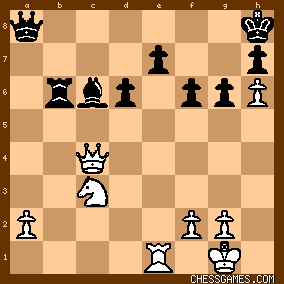
click for larger viewGame 4 - Larsen defended with an Alekhine Defence, but transposed into it from <1...Nc6>. It seems that two points up he was feeling confident enough to put psychological pressure on his opponent. Larsen achieved a good position from the opening and won a pawn. Towards the end of play, Larsen became careless. Whilst playing in an aggressive fashion, he overlooked or discounted several promising lines for Kavalek. 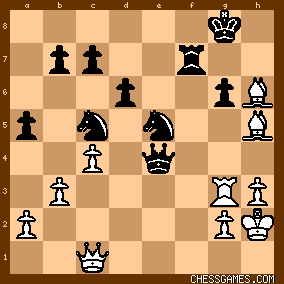
click for larger viewHere Larsen has just played <33...Qh4> now <35.Bxg6!> is very strong, 34. Bxg6 Nxg6 35. Rxg6+ Kh7 36. Bg5 Qe4 37. Rh6+ Game 5 - This was Larsen's forth win of the match and was voted as the tenth best game in Informator Volume 9. Larsen played aggressively against his opponent's Kings Indian Defence. On move 10, Larsen sacrificed a pawn for an open <h> file. Kavelek's King side disintegrated in front of his King. Larsen established Rooks on <g1> and <h1> with his Queen menacing the Black monarch. 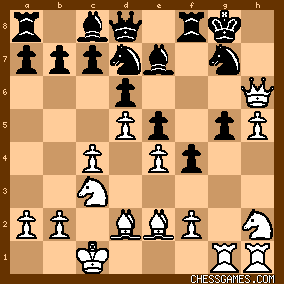
click for larger viewPosition after White's 17th Move
Larsen play was an onslaught in which he temporarily sacrificed his Queen. Kavelek managed to swap off material but was left with a cramped position and Larsen's dangerous passed <h> pawn. It was this pawn that eventually led to Kavalek's defeat, as he could not oppose its advance to the Queening-square. Game 6 - Having lost three successive games and only having scored one draw so far in the match, Kavalek gathered himself and won the sixth game with White. Kavalek's first win of the match was a well played and one in which he fully exploited Larsen's carelessness in an equal position. With little material remaining, Kavelek sacrificed a Pawn for control of the Black squares around his opponent's King. Larsen, a piece down, made a final and desperate effort to queen his <d> pawn 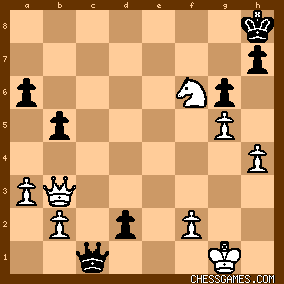
click for larger viewbut he could not achieve his goal as Kavalek's threats against his King were too strong and immediate. Game 7 -"Time trouble was probably the factor that contributed most to Kavalek's defeat in the Rook and Pawn ending of the seventh game but it cropped up in most of the other games too." 10. 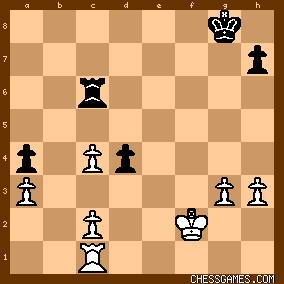
click for larger viewPosition after Black's 34th Move
Game 8 - Kavalek played cautiously and Larsen after playing his defence in an innovative fashion to equalise did not feel any need to unbalance the position and so ended the match four points ahead. 11. Notes:
1. "Chess", September 1971, vol.36, p.379.
2. http://www.olimpbase.org/Elo/Elo197... 3. http://www.chessmetrics.com/cm/CM2/... 4. "Illustrated London News", 21st February 1970, Baruch Wood, p.41. 5. "De tijd : dagblad voor Nederland", 29th April 1970. 6. "Illustrated London News", 15th November 1969, Baruch Wood, p.43. 7. "Chess Life and Review", September 1970, p.483. 8. "Los Angeles Times", 6th September 1970.
9. "Trouw", 5th December 1970.
10."Chess", vol.36,September 1970.
11. See Game 58: Garry Kasparov - Part One: Revolution in the 70s". This text and original research by User: Chessical.
Game 7 added to Database to complete the collection.
| 


